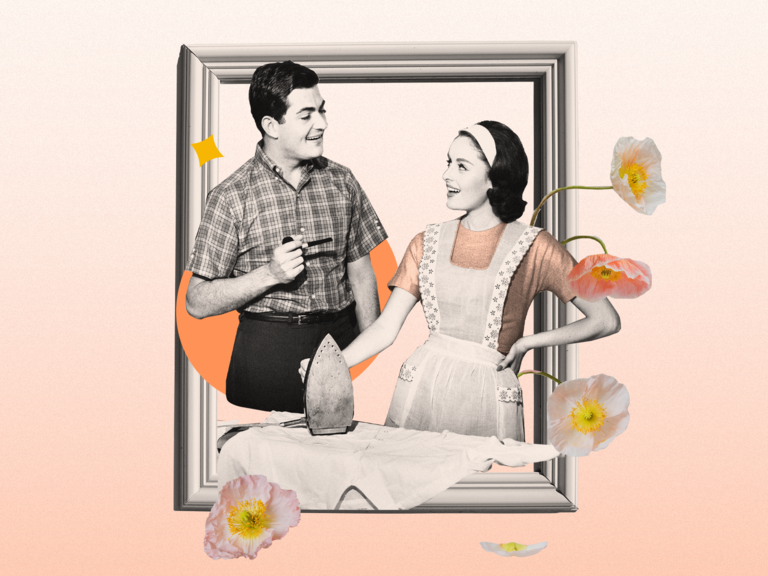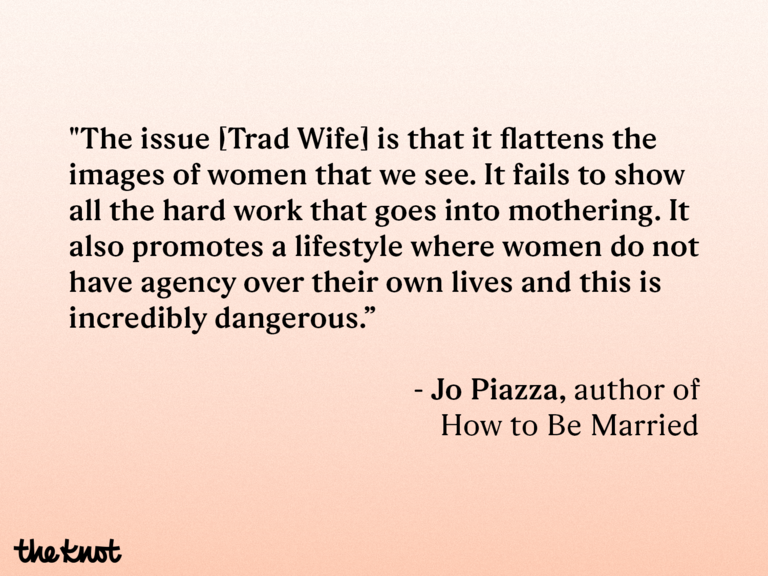Private Equity: How Trad Wives Are Impacting Modern Marriages

At a recent dinner with a group of editors, I gently raised the topic of trad wives and watched the conversation turn unexpectedly spirited and impassioned. Most agreed that this modern Stepford Wives-esque, social media movement challenges women's rights, or as one person described it, is a "sinister" guise fueling the patriarchal agenda. For that same participant, who climbed the corporate ladder in the '80s, the issue felt personal; it seemed to unravel decades of progress made by an entire generation of women in the workforce like herself.
Stay-at-home moms, another powerful sector of women, are also miffed by the purported lifestyle of trad wives, who perpetuate a false narrative that being relegated to domestic duties is glamorous, if not easy. Their biggest concern is that trad wives (whose social media lives revolve around rearing children, tending to their husbands, making sourdough bread from scratch, waking up with fresh blowouts and ultimately selling products or promoting their own brands) are not only being received by Americans. In some cases, they're revered. "The trend emerged in the past few years to describe a certain kind of social performance of womanhood where the woman is submissive to a man. She gives up her agency and submits to what could be considered traditional gender roles, where a woman's sole place is working inside the home and a man is the one who works outside of the home and makes money," says Jo Piazza, author and host of the Under the Influence podcast.
While my dining companions and I were on the same page, the polarity of opinions nationwide regarding trad wives has facilitated cultural commentary from dozens of major media outlets. It also means that for every table that vehemently opposes trad wives, there's another group of women who see themselves validated by these content creators. For hours on a Monday night, I researched self-proclaimed trad wives fueling the movement. One such post from Instagram account @TheTradWivesClub, featured a shareable meme that read, "Wife Life > Girl Bossing." As usual, I scrolled straight to the comments to see if there was support for the post, which there was. Looking at another influencer's #TradTok, I gasped as I read comments admiring and praising her femininity. "The trad wife trend is rooted in a false nostalgia for a kind of 1950s television family seen in Leave it to Beaver and Donna Reed. If you haven't come across a trad wife before, they essentially all look like Betty Draper in Season One of Mad Men," says Piazza.
How is it that, seven decades after the prototype of a dutiful housewife was born—when it evolved beyond the archetype of traditional wives—we're debating their merits? You might also wonder how this topic falls within our wheelhouse of love and weddings— I imagine an acerbic Instagram commenter writing, "Why do you care? You write about weddings." To which I respond, "Don't worry, darling. You're about to find out."
When they're engaged, couples often hear that they aren't only planning for the wedding; they're prepping for marriage. Yet equitable marriages and relationships are under scrutiny when content creators perpetuate false expectations of gender roles to promote themselves. "I have been reporting on social media trends and the impact that media has on culture and on women, in particular, for the past four years," says Piazza, who is also the author of How to Be Married. "Trad wife content does incredibly well on social media because the pictures are pretty and the posts looks idyllic, especially compared to the dumpster fire of world news right now. It is incredibly appealing, and a lot of people are consuming the visuals [and the messaging that they can hand financial ownership to their partners]."
Unfortunately, many are likely to believe the perfectionism or traditionalism promoted by these accounts is the standard, if not the norm. It could create a far from equitable dynamic within marriages. What trad wives don't show is the actual hard and often grueling work that goes into domestic labor or child-rearing. In addition, many trad wives who've built a niche following on social media have wealth or a steady income source that allows for additional support around the home. They won't be facing down a toilet bowl or scrubbing a floor, because that can be easily outsourced. You'll find their perfectly coiffed hair and manicured fingers kneading bread instead. "The issue is that it flattens the images of women that we see," Piazza says. "It fails to show all the hard work that goes into mothering. It also promotes a lifestyle where women do not have agency over their own lives, and this is incredibly dangerous."
Dangerous. Damaging. Disappointing. These are strong words, but they're a visceral response from people who can point to history. "The trad wife trend is so damaging because it is 2,000-year-old religious ideals being recycled and portrayed as 'new,'" says Eve Rodsky, researcher and bestselling author of Fair Play. "Unfortunately in a patriarchy, women can be complicit in their own oppression. When women are the ones delivering these trad wife messages on social media, they help perpetuate societal pressures and expectations about how women should spend their time. This not only limits women's opportunities for personal and professional growth, but also reinforces gender inequality."
Agrees Piazza, "When we see nostalgia for the 1950s housewife, à la Betty Draper, it ignores the stifling limitations put on women then. They couldn't get a credit card and had to submit to their husbands without question."
"It is important to recognize and challenge such representations as a tool of patriarchal control of women's time to create a more inclusive and equitable society," says Rodsky. "TL;DR? Same shit, different decade."

The discourse has much to do with power dynamics. Trad wives tend to defer (or "submit") to the person in power, which is often the male in the relationship. They're relegated to domestic duties, which includes picking up after their partner. "The work that it takes to run a home and a family is crucial, but it has to be shared, no matter who's making more money," says Rodsky. In addition, allowing one partner to bear complete financial responsibility leads to other risks within a partnership. "It creates a dynamic where one person has control and power over the other person, which can often lead to incredibly damaging relationships and abuse," Piazza says. (Indeed, the data tracks. According to the National Network to End Domestic Violence, financial abuse also occurs in 99 percent of domestic violence cases.)
Power and money aside, Rodsky points to one more element at stake. "Time is our most valuable currency, and we all deserve equal time and choice," she says. "Partners need to make sure that they are both get- ting an equal amount of time to focus on the things that bring them joy, or what I call the happiness trio: self-care; adult friendships; and the 'unicorn space,' pursuing curiosities and sharing them with the world."
What's clear is that we have to reconcile social media use and self-worth. Therapists will say self-confidence plays an influential role in a marriage. The perfectionism projected by trad wives, however, can impair how we view ourselves at home. Most notably, the argument here is not to be judgmental of trad wives, but to challenge what influences our ways of thinking. The algorithm knows us more than we realize, so how can we make it serve us?
"We need to be showing more of real life: the real work that we do as women, the real way our houses look when we don't have time to clean, the real exhaustion of motherhood," says Piazza. "But we also need to celebrate the wins of women's ambition in all things. It doesn't just have to be ambition in the workplace, but ambition in the home, ambition to have a gorgeous garden, ambition to raise money for your kid's school. We also need to talk more openly and honestly about finances and how women need power and control over a household's finances."
While equity within each marriage and household looks different for every couple, there are plenty of healthy displays of partnership out there. You may notice them in your own families and friend groups. "I like the idea that we are elevating the kinds of work that women do in the home to something that we do want to see, to something that is aspirational," Piazza adds. "The danger in that is when you say, 'This is the only thing a woman should be doing. This is the only role that a woman should play.' If we cling to this false nostalgia where women had it incredibly hard, where they did not have agency or autonomy, we could roll back the laws that gave us independence without even realizing it."
After all, real life doesn't necessarily translate to an edited 30-second video set to Darlene Love's "(Today I Met) the Boy I'm Gonna Marry." It occurs, indeed, IRL.
This story first appeared in the Fall 2024 issue of The Knot Magazine.























